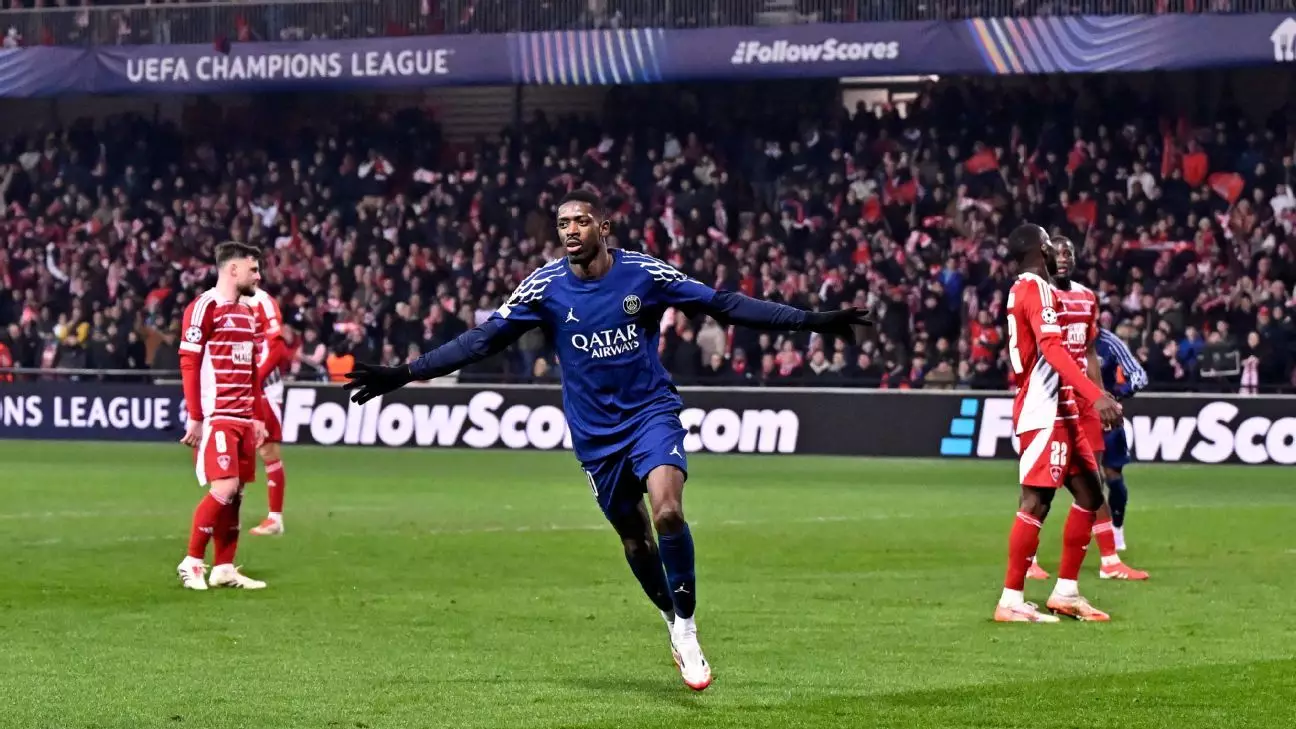In the realm of professional football, the trajectory of a player’s career can often witness significant transformations, punctuated by peaks of extraordinary success and valleys laden with challenges. Ousmane Dembélé, the French forward currently dazzling the pitch for Paris Saint-Germain (PSG), exemplifies this rollercoaster journey beautifully. After a stunning brace against Brest during the UEFA Champions League knockout phase, it’s intriguing to analyze not just his performance, but the psychological and tactical evolution that has turned him into one of the most formidable forwards in Europe today.
Despite his team’s convincing 3-0 victory, Dembélé’s demeanor reflected a complexity that many might not instantly associate with a player who had just helped secure an essential win. His frustration stemmed, amusingly enough, from missed opportunities—chances that could have further bolstered his already impressive goal tally. The contrast of his recent form—netting 18 goals in his last 12 appearances—against his irritation at not reaching personal standards provides a glimpse into a refined mentality that speaks volumes about his character as an athlete.
Dembélé’s shift from carefree winger to a player who expects perfection from himself represents a broader metamorphosis in his playing style. In the past, comparisons could be drawn between him and traditional wingers—players predominantly focused on assists rather than their scoring abilities. Now, under Luis Enrique’s tactical guidance, Dembélé assumes the role of a false nine, pressing him further into a position where goal-scoring is paramount. Such evolution not only motivates him to score but also reminds us that athletes, much like artists, can revel in their craft while juggling their innate desire for excellence.
Dembélé’s statistical achievements during this season cannot be overstated. To consistently deliver impressive performances—like scoring ten goals in four matches—he has transcended expectations and reignited discussions around his potential. While some critics may argue that the quality of opposition plays a role in such statistics, it’s crucial to note that PSG has faced formidable teams like Manchester City and Lyon during this remarkable stretch. Dembélé’s ability to rise to the occasion against competitive squads reflects his transformative prowess.
What stands out further is Dembélé’s extraordinary start to 2025, having racked up 15 goals in just nine matches. This staggering number eclipses his entire output from 2024, signaling a profound change that metrics alone cannot capture. Statistics aside, the psychological boost that accompanies such performances cannot be ignored. Each goal scored not only solidifies his confidence but strengthens the belief within his teammates about his vital role on the pitch.
However, the question remains: what catalyzed this phenomenal form? Luis Enrique’s initial controversial decision to bench Dembélé during an October match against Arsenal may be the pivotal moment that sparked his resurgence. Instead of allowing bitterness to fester, Dembélé seemingly took this setback to heart, channeling it into constructive dialogue with his coach. This interaction proves that even a temporary omission from the squad can act as a crucible for personal growth, encouraging players to reassess their engagement with the game.
The subsequent shift in tactics — repositioning him as a false nine — allowed Dembélé to exploit spaces more efficiently, inviting him closer to the goal. This not only reinvigorated his game but forged a stronger rapport with his teammates, emphasizing the collective over the individualistic talents. The intensive focus on finishing drills following his early struggles represents a dedication to enhancement, merging physical conditioning with mental preparation.
As Dembélé navigates through this phase of prosperity, the inevitable question arises: how long can he maintain this extraordinary form? While it’s unrealistic to expect perfection week in and week out, the foundation for sustainable success is evident in his commitment to continual improvement and tactical adaptability. His current performance isn’t merely an anomaly; rather, it is the result of rigorous dedication, personal evolution, and collective synergy within the PSG squad.
Ousmane Dembélé’s journey illuminates the possible transformations within a professional athlete’s career. From grappling with personal expectations to redefining his role within an evolving tactical framework, he encapsulates the essence of resilience. As spectators and fans, we can only hope that this promising chapter continues to unfold, allowing Dembélé to flourish further as a key player for PSG and possible contender for individual accolades in the footballing world such as the highly coveted Ballon d’Or. His story—a blend of talent, hard work, and strategy—provides an inspiring narrative in what is surely just the beginning of a new chapter in his impressive sport career.

